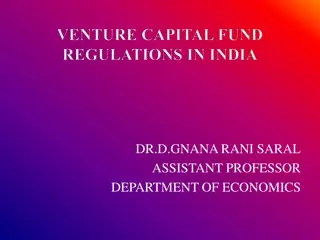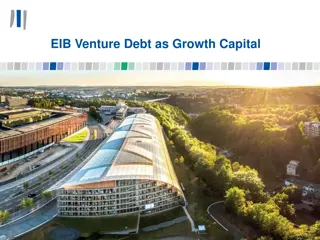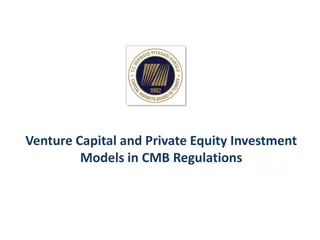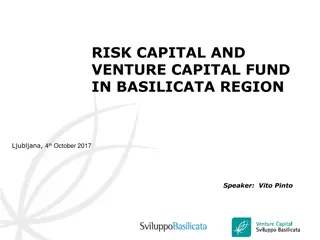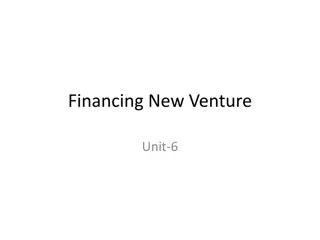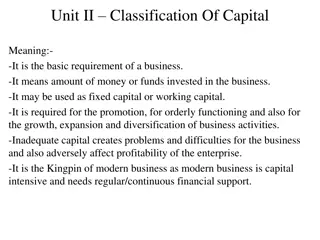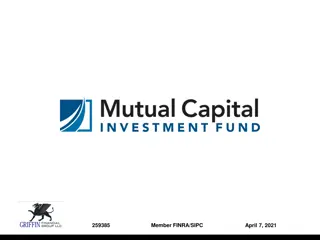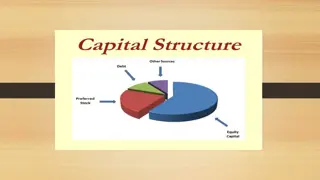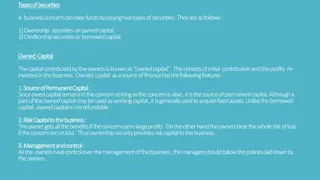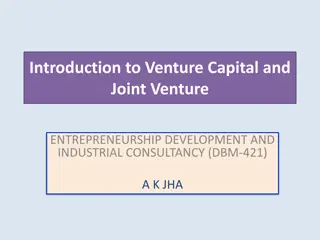Understanding Venture Capital in Business: Meaning, Definition, and Features
Venture capital provides long-term risk capital for high-tech projects with growth potential, with investors sharing risks and rewards. It typically involves equity participation and aims for capital appreciation upon disinvestment. This type of financing is crucial for commercializing new ideas and technologies, emphasizing continuous involvement to ensure success.
Download Presentation

Please find below an Image/Link to download the presentation.
The content on the website is provided AS IS for your information and personal use only. It may not be sold, licensed, or shared on other websites without obtaining consent from the author. Download presentation by click this link. If you encounter any issues during the download, it is possible that the publisher has removed the file from their server.
E N D
Presentation Transcript
VENTURE CAPITAL MRS.M.MARIA JESSICA, PG & RESEARCH DEPARTMENT OF COMMERCE, BON SECOURS COLLEGE FOR WOMEN, THANJAVUR.
CONTENTS MEANING DEFINITION FEATURES OF VENTURE CAPITAL MODES / TYPES OF VENTURE CAPITAL
MEANING Venture Capital is long-term risk capital to finance high technology projects which involve risk but at the same time has strong potential for growth. Venture capitalists pool their resources including managerial abilities to assist new entrepreneurs in the early years of the project. Once the project reaches the stage of profitability, they sell their equity holdings at a high premium. Examples : Google Inc, is a major venture capitalist and also some other most active venture capital firms in India like helion venture partners, India Quotient and intel Capital etc
DEFINITION A venture capital company is defined as a financing institution which joins an entrepreneur as a copromoter in a project and shares the risks and rewards of the enterprise .
Features of Venture Capital Venture capital is usually in the form of an equity participation. It may also take the form of convertible debt or long term loan. Venture capital is available only for commercialization of new ideas or new technologies and not for enterprises which are engaged in trading, booking, financial services, agency, liaison work or research and development. Venture capitalist joins the entrepreneur as a copromoter in projects and share the risks and rewards of the enterprise.
Contd There is continuous involvement in business after making an investment by the investor. Once the venture has reached the full potential, the venture capitalist disinvests his holdings either to the promoters or in the market. The basic objective of investment is not profit but capital appreciation at the time of disinvestment. Venture capital is not just injection of money but also an input needed to set up the firm, design its marketing strategy and organize and manage it. Investment is usually made in small and medium scale enterprises.
Methods of Venture Financing Venture Capital Income Notes Equity Participation Conventional Loan Conditional Loan
Contd Equity Participation - Venture capital firms participate in equity through direct purchase of shares but their stake does not exceed 49 per cent. - These shares are retained by them till the assisted projects making profit. - These shares are sold either to the promoter at negotiated price under buyback agreement or to the public in the secondary market at a profit.
Contd Conventional Loan -Under this form of assistance, a lower fixed rate of interest is charged till the assisted units become commercially operational, after which the loan carries normal or higher rate of interest. - The loan has to be repaid according to a predetermined schedule of repayment as per terms of loan agreement.
Contd Conditional Loan - Under this form of finance, an interest free loan is provided during the implementation period but it has to pay royalty on sales. - The loan has to be repaid according to a predetermined schedule as soon as the company is able to generate sales and income.
Contd Income Notes - It is a combination of conventional and conditional loans. - Both interest and royalty are payable at much lower rates than in case of conditional loans.
Types of Venture Capital Funds Early Stage Financing Acquisition or Buyout Financing Expansion Financing
Contd Early Stage Financing - This is the initial stage of investment or the first step. sub stages - seed financing, startup financing and first stage financing. - Due to the complex nature of business, this is further divided into 3 establishing their startup. - Seed financing is the first set of money given to the founder for development of products and services. - Startup financing is when the set of money is given for the financing. - When a startup intends to expand business, it requires first stage Example : Let s Venture and Growx Venture
Contd Expansion Financing seed funding and requires funds for expansion and marketing. - This is the second stage, once the startup has utilized its funds that are required by a startup during an IPO (Initial Public Offering). Example : Ventureast Fund advisors India Limited. - Expansion financing also includes bridge financing - the
Contd Acquisition or Buyout Financing company or parts of a company, it is known as acquisition financing. - When a company needs funds to acquire another another company s particular product. - A buyout financing is when a company seeks to acquire Example : Warburg Pincus



